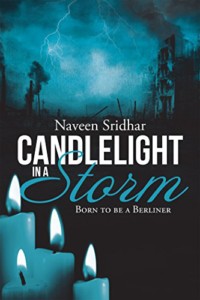Title: Candlelight in a Storm: Born to be a Berliner
Author: Naveen Sridhar
Publisher: AuthorHouseUK
ISBN: 978-1-5049-4454-0
Pages: 268
Genre: Historical Fiction
Reviewed by: CC Thomas
Pacific Book Review
Author Naveen Sridhar has written a literary love story in Candlelight in a Storm which is partial memoir, partial biography. Sridhar’s connection with the subject of the story, his wife Renate, gives a unique and perspective about growing up in Germany during WWII and allows the readers a realistic perspective of what life was like behind the Berlin Wall. While most books about this time period focus on Allied soldiers and their families or the Holocaust, this book focuses on how the German people also suffered during this pivotal and haunting time.
Most historical books and novels focus on the heroes and daring exploits of famous characters. Yet, what are daily living conditions of regular men and women? Their stories are seldom heard. While reading an exciting spy or political thriller is always a good time, there are few novels which detail what happened to those who weren’t famous or didn’t get a medal. This novel details what life was like for ordinary Germans living under the rule of governmental policies and ideologies in which many could not be trusted nor believed in. What do regular people do in such extraordinary time as these? They go on living as they always have, and their tales become as inspirational as those of traditional war heroes.
The story begins with a young mother whose husband has been deployed and is serving in the armed forces. She wants to stay in her home with her children and wait for his return, but simply can’t put off any longer the reality he probably isn’t returning. Renate and her family endure each challenge which came their way and their example is truly inspirational. Life on either side of the Berlin Wall was lived just as those who survived in the occupied territories—a constant fear of potential bombings, food rationings, daily sacrifices and feelings of disconnection with the rest of the world. This “shoot on sight” mentality created a civil war along with a prison for those citizens living within the walls.
What I especially loved about the story was the glimpse this gave into the unsung heroes – the wives and mothers who silently endured the pain and heartbreak of missing loved ones while keeping their country running. Candlelight in a Storm showed very clearly what happens to families with the realities of lives shaped by war. Sridhar’s depiction makes the heartbreak and confusion of saying goodbye to husbands and fathers who will never come back so real. It’s hard to imagine a loved one simply never being heard from again and watching the example of this family pick up the pieces and resume some semblance of a life was agonizing.
Another fascinating part of the book was looking at the difficulties citizens faced when traveling between East and West Berlin. Seeing how the country was divided because of a border wall and making enemies out of former neighbors really resonated and both topics made instant connections with today’s news headlines. While it seems as if history is stiff and cobwebbed, a careful look will show that modern people deal with these same issues. The lessons of diversity and acceptance, so new to us today, were also challenges for the characters during this time period. A modern reader will have a lot to consider and much to learn from Renate’s examples. At the end of the day, indeed, we are all Berliners.


